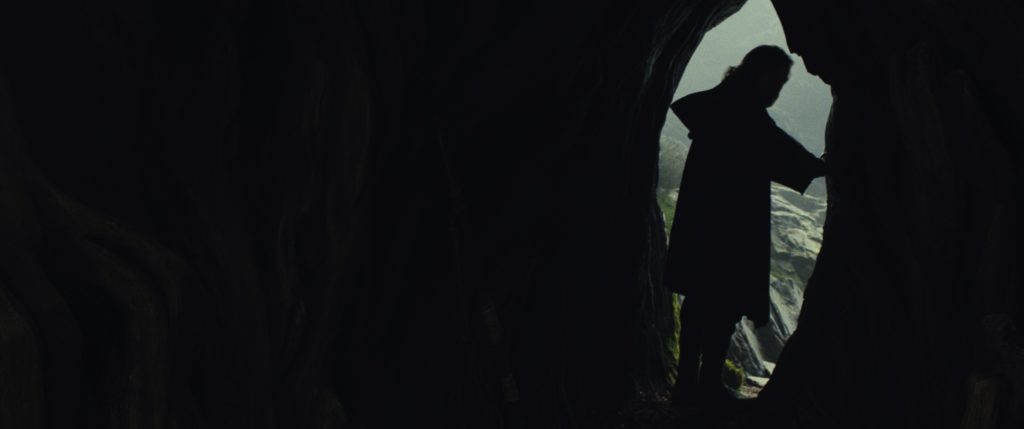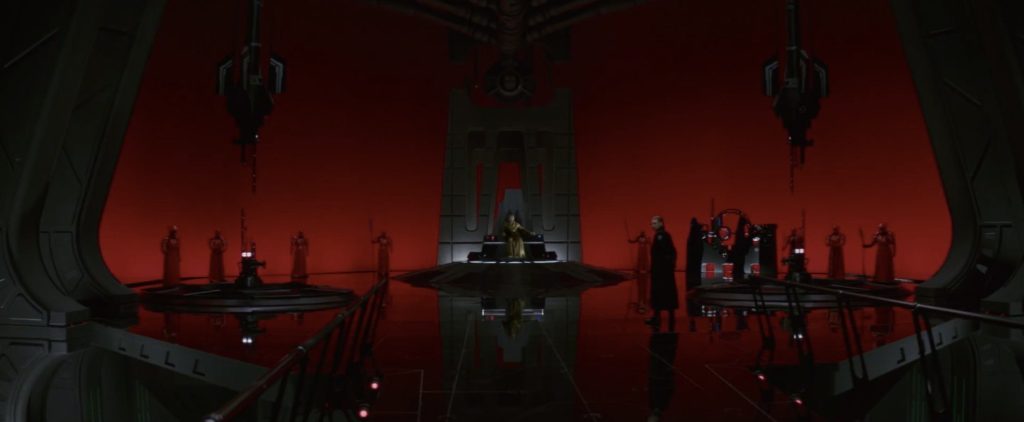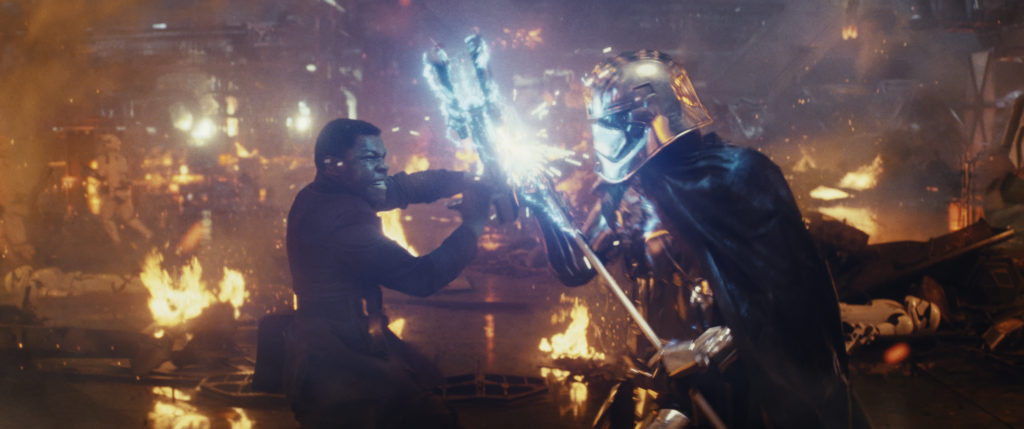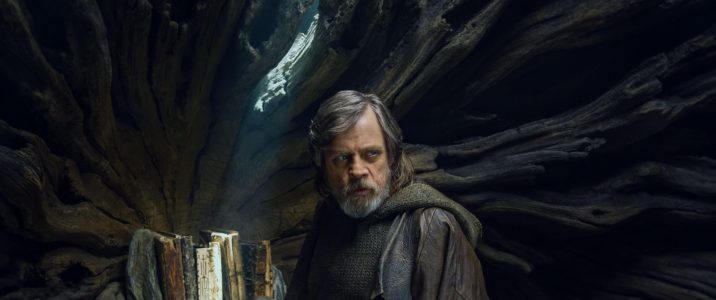Star Wars is about many things, not least of all heroics. Good and Evil are clearly demarcated, though even the much-maligned prequel trilogy sought to explore the spectrum along which these notions rule. There is even a line in the newest film in the series, The Last Jedi, about the Force, that mythical presence permeating the Galaxy, denoting “balance”. Indeed, there is a great deal of questioning in The Last Jedi of the possibility in reconciling diametric opposites, not just the aforementioned markers of morality; past and future, privilege and profiteering, even the familiar with the unknown are all topics of focus. Writer/Director Rian Johnson gamely attempts to explore the ambivalent gray areas of these dichotomies, ultimately to uneven results. His mark on the 40-year old franchise is ambitious in it’s stabs at deconstructing the mythology established by George Lucas yet ironically struggles to meld these elements into a completely satisfying whole.
Superficially, the film seems to mirror the structure of The Empire Strikes Back, still the high-mark of the franchise, when Rey (Daisy Ridley), the young heroine from the previous chapter, asks Luke Skywalker (Mark Hamill) to help her hone her nascent powers. Yet her first encounter with Skywalker is far from amiable, and it is both pleasantly surprising and simultaneously frustrating watching their relationship unfold. Though Luke eventually relents to her pleas for lessons in the ways of the Force, there is very little of their meditative training that seems to indicate Rey gains much from Skywalker. By the end of the film, she is no better and no worse at wielding a light saber than she was at the end of The Force Awakens. What we do glean from these interactions are more revelations about how the legendary Skywalker came to cast himself into exile. If nothing else, we are treated to a rueful, even embittered Luke Skywalker who, in his own words, “came to this island to die.” As the broken hero, Hamill bears the lion’s share of responsibility for the poignancy of his scenes.

That is to say the film isn’t a dirge. On the contrary, Johnson injects a surprising amount of humor into the proceedings. Aside from the prevalence of Porgs, the latest creatures designed for your holiday shopping list, there are scenes of comic invention and verbal quips from returning characters like the puckish pilot Poe Dameron (Oscar Isaac) and Finn (John Boyega). The latter finds himself embroiled in a desperate mission with a soldier of the Resistance named Rose (Kelly Marie Tran) to save their comrades from the encroaching armada of the First Order. Their adventures lead them to what can be described as an intergalactic Monte Carlo. These sequences, which see Johnson indulging in satirical sketches of an alien haute bourgeoisie, strive for social commentary while abstaining from setting their sights on any particular target. Rather than opting for stringent political critique (a far cry from the most charged moments of Revenge of the Sith), The Last Jedi is content to fixate on the populist dynamic between the affluent and the impoverished while making reference to the ambivalence which propagates this deeply entrenched division.
If ambivalence often begets nihilism, then this adage isn’t more apparent in The Last Jedi than in the evolution of the character of Kylo Ren (Adam Driver). Indeed, he and Luke provide the most compelling contrast in how their differing ideologies have nevertheless brought them to practically the same emotional void, thanks in no small part to their own fractured relationship. The cause of their friction, without explicating any of the twists Johnson embeds in his tale, is one of self-fulfilled prophecies and tragic misunderstanding. In this respect, these developments are as indebted to Johnson’s previous film Looper as they are to the pre-existing tropes of the Star Wars series. Further cinematic allusions toward the films of Hideo Gosha and anime, particularly the kinetic verve of Cowboy Bebop, abound. These influences impact the aesthetic as much as, if not more than, the narrative, which in turn generates some of the most striking imagery in any Star Wars film to date.

Indeed, the struggle to reconcile personal and cultural history has become the consistent thematic concern of this new trilogy. If the past has been memorialized, even fetishized to an astonishing degree, then an uncertain future is thrown ever more into doubt by prescriptive designations of self and system. “We are what they grow beyond,” a character decrees in the most moving exchange of the film. “That is the true burden of masters.” As a commentary on the franchise itself, this aspect of The Last Jedi is bolder than it’s predecessor’s complacency in contently borrowing wholesale from the past. The climactic fight demonstrates this primarily because it distills it’s combatants into symbolic figures forced to syncretize their own places within a grander mythos, and it is all the more exciting for doing so.
This tendency for symbolic gesturing is also the film’s greatest setback. Too many of it’s characters, primarily the villains, feel like catalysts in the workings of the plot. Supreme Leader Snoke (Andy Serkis) and Captain Phasma (Gwendoline Christie), particularly, serve as little more than oppressive figures of authority meant to be challenged, a conceptual flourish that never becomes dramatically satisfying. A character like Snoke, ensconced in enigma, nevertheless feels perfunctory when compared to past Star Wars villains. The consequence of these inert developments in character undermine several of the bombastic twists Johnson freely lobs at the audience in the second half of the film. Because of what little establishment there was in The Force Awakens of the logistics regarding the galactic hegemony of The First Order, The Last Jedi often feels more clever than intellectually or even emotionally involving.

It’s telling that the most powerful moments of The Last Jedi belong to the stalwart veterans. The heroes of the newest generation still seem beholden to the perfunctory demands of their script in performing stoic heroism or comic relief. Too few of the newest additions to the cast, including Laura Dern, feel like they occupy any space beyond the confines of the film itself. Benicio del Toro fares best in elevating the archetype of a roguish scoundrel while Tran has pluck and charm to spare which helps her gloss over the more bland aspects of her character. If there is one major component that must be remedied for the final installment, it is a more sound establishment of the roles these new characters occupy within their galaxy.
There is much to admire and even like about the eighth installment of one of Hollywood’s most durable epics. There is a playfulness not merely with action but tone and even temporal compression that proves inventive and compulsively watchable. Yet for a film where it’s villain proclaims his desire to “let the past die”, Star Wars: The Last Jedi has no clear grasp on it’s present, which makes the ambiguity of it’s future more uncertain than anyone would care to admit. There remains so much to be explored and very little room left for exploration. In a galaxy of possibility, it feels like the Disney era has cordoned itself off to a cluster of stars.
